

McCorkle Legends, Traditions
& Stories of Early Pennsylvania & Ireland
In our experience, there is almost always some truth in all legends; however,
discerning which part of the story is the truth can sometimes be very difficult
or even impossible. Discovering the truth is complicated by certain aspects of human
nature. It seems that almost every person that records a legend, etc. is
compelled to add something of their own to the story. Sometimes these additions
seem to be intended as explanatory remarks; however, the recorders often do not
adequately differentiate between the story as they found it and their comments.
Worse yet, sometimes they attribute their revised legend to the source of the
original. The same tendency also applies to lineages since most family
historians strive to extend their lineage back in time. It seems that, in
desperation, these lineage "extensions" are often plucked from the existing
assortment of legends, further "enhanced" to fit the particular lineage and then
published in one form or the other. To show how the legends and lineages are
enhanced over time, we have tried to
find and record exact copies of early published versions, as well as, later versions.
Our comments are completely separated from the stories. Some of the most creative 21st century McCorkle lineage extensions
and enhancements can be found at Ancestry Family Trees. These remind us of the
enormous number of copied GEDCOMs that have been downloaded, copied, spliced and
diced, then uploaded to this site.
There seem to be similar legends and
traditions associated with virtually every early American McCorkle line. The vast majority of these stories begin
with the arrival of the McCorkles in
Philadelphia and/or the surrounding counties (Lancaster, Chester & Bucks,
etc.) in southeastern Pennsylvania.
In his 1986 book, From Viking Glory..., Louis McCorkle proposed that
James, Samuel and William McCorkle were the progenitors of many of the American McCorkles; however, no primary records have ever been found
by anyone for
James and William. Since publication of this book, several other early
Pennsylvania McCorkle branches have been researched and other McCorkle
immigrants and progenitors have been asserted. The earliest primary record for any
McCorkle in Pennsylvania is a 1737 Paxtang Township, Lancaster County land
warrant that
mentions Samuel McCorkle as a adjoining neighbor. The last record for Samuel is in
1749/1750, so he seems to have died or removed about this time.
Very few vital dates are mentioned in the earliest versions of the legends, but this has not
stopped people from adding these dates as they enhance the stories. Starting
about 1750, there are many more surviving records for Pennsylvania McCorkles
but, by then, many of the original immigrants had left Pennsylvania or died. Since there are no records at
all for James and William, we can only guess at the vital dates associated with
them but, if they existed at all, we would guess that they probably died before
Samuel. Another significant problem is that some historians and researchers seem
to have confused the three men mentioned in the legends with later men with the
same names. They have also confused and even combined the descendants of the
original Pennsylvania McCorkles.
Our
nomination for the most confusing legend goes to Alexander McCorkle of
Lexington, Virginia. Three different father's have been posited for Alexander:
Matthew McCorkle of Rowan, William MacCorkle and the unknown Scottish father of
said Alexander and his alleged brother, Samuel McCorkle of Paxtang. This confusing
situation is intensified since Alexander of Lexington and his alleged nephew,
Alexander McCorkle of Rowan, have been almost hopelessly confused by many.
Recently, yDNA testing has revealed that Samuel McCorkle (c1720-1788) of Augusta County, Virginia, John McCorkle (1734-1810)
of Mecklenburg County, North Carolina, and William McCorkell (1760-1827) of
Ulster, Northern Ireland were closely related. If more McCorkle descendants would join the
McCorkle DNA Project, perhaps
some of the early American McCorkle branches could be sorted out and/or confirmed.
Samuel McCorkle of Paxtang
From: Jacob Stŭtzman
(?-1775); His Children and Grandchildren by John Hale Stutesman, Jr.
Pub. 1982
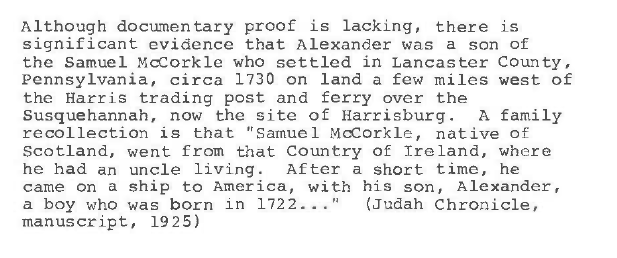
John Hale Stutesman (1920 - ) is a very proficient and diligent researcher. He had a lengthy correspondence with Louis McCorkle and much of Stutesman's research ended up in McCorkle's From Viking Glory.....so the use of the words "significant evidence" should not be underestimated. We cannot find any mention anywhere to the referenced "Judah Chronicle"; however, Samuel Brandon Judah (1845-1928) was the son of Samuel & Harriet Brandon Judah. Harriet was the daughter of Armstrong & Elizabeth McCorkle Brandon. Elizabeth was the daughter of Joseph & Margaret Snoddy McCorkle and granddaughter of Alexander McCorkle of Pennsylvania and Rowan County, North Carolina. It seems that Samuel Judah left genealogical papers which are archived at the Indiana Historical Society and the Indiana University Lilly Library. These papers are most likely the source of the "significant evidence" referred to by Stutesman. Louis McCorkle includes much the same information in From Viking Glory... and attributes this story to the Record of the McCorkle Family by Samuel B. Judah. McCorkle points out that Judah was born in 1845 and probably learned the McCorkle traditions from his grandmother and mother who lived until 1884 and took great pride in her McCorkle ancestry. This is about as good as it gets when considering the value of legends. However, Marsha Cope Huie, a lawyer and a very serious and meticulous family historian, is in possession for a large quantity of family correspondence relating to Alexander McCorkle and his descendants. This correspondence dates from 1829 and includes letters written to and from Margaret Morrison McCorkle, the second wife of Robert McCorkle, the son of Alexander. Nowhere in this correspondence are the parents or siblings of Alexander of Rowan mentioned.
Samuel &William McCorkle and several Alexander McCorkles
From: From Viking Glory: Notes on the McCorkle Family in Scotland
and America by Louis W. McCorkle. Pub. 1982
later
This is the same story as related by Stutesman above, except Louis McCorkle adds
Alexander, the alleged brother of Samuel to the quote by Stutesman. This alleged
brother relationship is a fascinating assertion to us; however, the only way we can make sense of the alleged Judah comment "Alexander went to
Lexington, where he became the founder of the McCorkles of that area" is to
assume that
Judah was referring to Alexander, brother of Samuel, not Alexander, the son of
Samuel. Samuel B. Judah was a descendant of Alexander McCorkle of Rowan County,
North Carolina and as Louis McCorkle points out, Judah was in a position to have
heard about his lineage from his mother and grandmother. Both Alexander of Rowan
and Alexander of Lexington seem to have been born about 1722, so it is easy to confuse them;
however, it is difficult (but not impossible) to see how either Alexander could have been a brother of Samuel of Paxtang
and this seems to leave
the door open for yet another older and unrecorded Alexander McCorkle. It is also interesting that
Louis McCorkle does not include Alexander
McCorkle, the alleged brother of Samuel, in his list of McCorkle family progenitors in Pennsylvania. This is
probably because there is no primary evidence of Alexander in Pennsylvania and,
as far as we know, this story is the only one that he is a part of. Some of this
confusion might be cleared up by seeing exactly what Samuel Judah recorded.
Samuel McCorkle, his son Alexander & his
brother Alexander
From: Record of the McCorkle Family, aka Judah Chronicle
by Samuel B. Judah, self pub. July 7, 1924
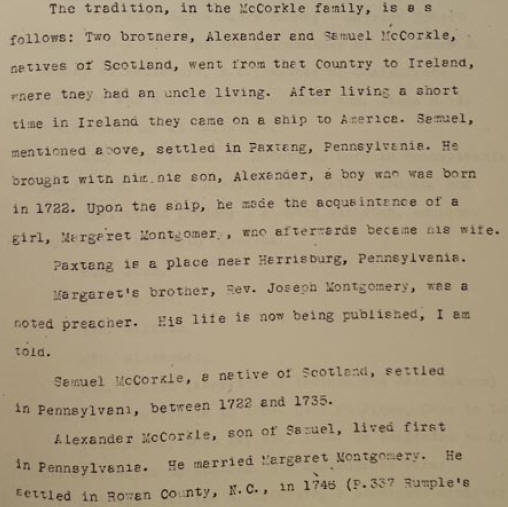

later

This image shows the source for the two preceding stories and is part of the family research of Samuel Brandon Judah (1845-1928), a descendant of Alexander McCorkle of Rowan County, North Carolina. A photographic copy of Judah's Record of the McCorkle Family is a small part of the research done by John Hale Stutesman and donated to the Rowan Public Library in Salisbury, North Carolina. We have compared these photographs with the record on file at the National Library of the Daughters of the American Revolution in Washington, DC and microfilmed in 1971 by the Genealogical Society of Salt Lake City. The images are identical. We are indebted to David McCorkle for providing us with both sets of of images. Judah's legend asserts with absolute clarity that Alexander, the brother of Samuel, was the founder of the Lexington, Virginia McCorkle branch and that Alexander, the son of Samuel, was the founder of the Rowan County, North Carolina McCorkle branch. This story is essentially the same as the ones related above by Louis McCorkle and Stutesman, except that McCorkle apparently confused the son and brother of Samuel. However, his point probably was that the two Alexanders seem to have the same generally accepted birth dates (c. 1722). Such an occurrence was unlikely, but certainly not impossible, for an uncle and his nephew, so this was probably the reason that Louis McCorkle seems to place more credence in the assertion (see below) that William McCorkle was the father of Alexander of Lexington. However, there are other alternatives: The generally accepted birth date for Alexander of Lexington could be incorrect or there could have been an unrecorded Alexander McCorkle who was the brother of Samuel and the father of Alexander of Lexington (b. c. 1722).
James, William & Alexander McCorkle
From: A History of Rockbridge County by Oren Frederic Morton,
Pub. 1920.

later

Oren Frederic Morton (1857-1926) was one of the
foremost historians for some of the counties of Virginia and West Virginia. His
book on Rockbridge County includes a chapter entitled "The MacCorkle Family"
which includes a rather rambling lineage of some of the children of Alexander of
Lexington. Morton's historical works can be awesome, frustrating & even amusing at
the same time.
Jeff
Carr has written a very good assessment of Morton's techniques. Morton uses
the phrase "we are told" frequently and this is a problem for us. It would be
very nice to know who was doing the telling.
The two snippets above are separated by several pages and seem completely
disconnected. The two Alexanders mentioned are often confused because they both
seem to have been born about 1722. The Alexander (Alexander of Rowan)
described in the upper snippet is named as a son of Samuel McCorkle by Samuel Judau, so
Morton's story completely contradicts the account of a person that should have
known the facts. Louis McCorkle does not even mention Morton's assertion
concerning James' children and this is unlike McCorkle. I am inclined to think
that Morton, or his source, just got the story completely wrong. The description
of William MacCorkle described in the lower snippet seems odd to us. Some have
tried to explain the reference to "Southern Ohio" by explaining that at one time
Augusta County encompassed what became to be known as the Northwest Territory
which included Ohio. This is true, but why state that William moved to Ohio?
Since there are no records of William in Pennsylvania, Virginia or Ohio, I
conclude that, if he existed at all, he must have died within a few years
of his arrival in America. Since this story bears somewhat of a resemblance to
the story below by Livia Nye Simpson-Poffenbargar, there
is another possibility. If the names of William and Alexander are
transposed, then the two stories are quite similar.
William & Alexander McCorkle
From: The Battle of Point Pleasant; A Battle of the
Revolution by Mrs. Livia Nye Simpson-Poffenbargar. Pub. 1909
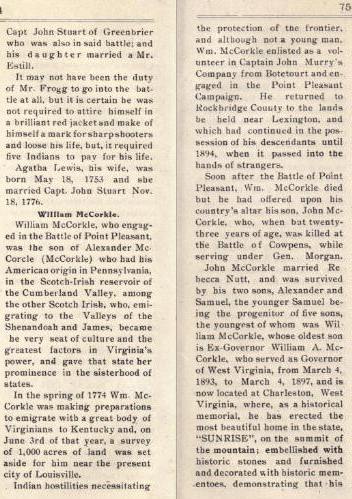
This is another example of a legend that has some facts, a lot of flowery
assumptions and several significant errors. The John McCorkle that married
Rebecca McNutt was the son of Alexander (1720-bef 1780) & Mary McCorkle, not
William McCorkle. Alexander & Mary did have a son William, but he died September
1818, not "soon after the Battle of Point Pleasant" (Oct 10, 1774). Also, there is no record of a June 3, 1774 Kentucky survey for
William McCorkle; however, there is such a record for James McCorkle on this
exact date in Kentucky. The 1000 acre land warrant for this land was first
issued to Capt. John Blagg of the First Virginia Regiment, then assigned to
Daniel Trigg and later assigned to James McCorkle. The land was on Bear
Grass Creek, a branch of the Ohio River, one & one-half miles above the
Falls. This location is near present day Louisville. Four days later, on June 7,
1774, two 1000 acre tracts near Bear Grass Creek were surveyed for William
Christian. The warrants for these tracts had also been issued to John Blagg and
then assigned to Christian. Because James McCorkle and William were business
partners in Virginia, were fellow militia officers and were closely associated
in other ways, we assume that the James McCorkle that obtained the Bear Creek
survey was the person described in "James
and William McCorkle of Ulster & Montgomery Co., Virginia c.
1770"
However, none of this seems to identify the
William McCorkle that was in John Murry's Company. He might have been the son of
Alexander, but nothing in this story even hints at this possibility. Although Livia does not
mention it, there was also a John McCorkle at the Battle of Point Pleasant. He
was part of Capt. William Russell's Company. Both William & John McCorkle
seem to have survived the battle which produced numerous casualties on both
sides.
James McCorkle
Genealogical Gleanings of Siggins and
Other Pennsylvania Families by Emma Siggins White. Published 1918

This lineage could have been published yesterday, instead of 1918. It seems to
be one of those desperation lineage extensions discussed in the introduction to
this page. In this case, the extension is further "enhanced" with irrelevant
notations served up as some sort of justification for the extension. It is not clear which
of several men named James
McCorkle was posited to be the father of John, Alexander, Samuel and Patrick
McCorkle, but
the supporting citations have nothing to do with any of them. The three
references to James McCorkle concern the same man that came to America about
1770, became quite successful in a short time, but never married. The Samuel
McCorkle of Green County, Kentucky was the son of Samuel & Sarah Buchanan
McCorkle of Augusta County, Virginia. However, if the posited
James was supposed to be the mythical James that had seven mythical sons and
seven grandsons named John, then we can cut the author a little slack. It seems
that almost every historian has posited James McCorkle as the father of some
McCorkle, even though James remains a
person whose existence has never been proven.
On the bright
side, the focus of the article is on the descendants of John (b.c. 1740) &
Elizabeth Ruth McCorkle and this part of the story seems to be accurate. As such, it should serve as a
starting point for those who have confused this John McCorkle with the one
that married Rebecca McNutt and died from his wounds received in 1781 at the Battle of Cowpens. The
reason that this is a fact and not a legend is that John, the husband of
Rebecca, executed a will before he left Rockbridge County to serve his country.
James & Samuel McCorkle
From: McCorkle History, Typical of Pioneer Family by R. C.
Hall, Huntington Herald Advertiser, Pub. Jan 14, 1934
Transcribed from a Jennifer
Bruckler manuscript by D. Scott Stewart in 2000
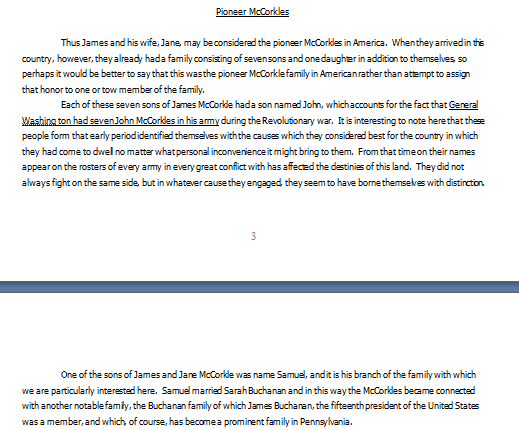
The author, R. C. Hall,
PhD, was a rather frequent contributor of historical articles to the major
Huntington, West Virginia daily newspapers. He wrote this
Sunday magazine supplement article after interviewing some of the McCorkles that
lived in Huntington, West Virginia and Lawrence County, Ohio. He also seems to
have done some additional general research using books that were available to
him at the time. It is a relative long, well written and interesting article;
however, the are several errors including the glaring omission of one complete
generation of the Robert McCorkle lineage. We cannot tell how or where this
error occurred since we have not seen an image of the original article. The source of the
error could have been the McCorkle informant, Mr. Hall or one of the
article's transcribers. The account of James & Jane McCorkle and their seven sons
sounds very much like the one purportedly on file at the Kentucky
Historical Society; however, I have never seen any reference to specific Bible,
family history record, etc. that supports this legend.
This article
also seems to be the source for yet another legend that alleges that
John McCorkle, the brother of Robert of Lawrence County, Ohio was murdered May
6, 1814 while traveling from Kentucky to visit his brother in Lawrence County.
We have never found even one scrap of information that substantiates this story
and, in fact, we have found significant evidence that suggests that John died
many years later. The details of this
evidence are here.
Irish Three Brothers Legend
Snippet from: Defunct "McCorkell Line 1778 - 1897" by John McCorkell
.jpg)
From: Notes of Lady Aileen McCorkell (Courtesy of Laurie Thompson, Melbourne, Australia)

Lady Aileen Booth McCorkell (1921 - 2010) was the wife of Colonel Sir Michael McCorkell, who was the nephew of Sir Dudley Evelyn Bruce McCorkell, discussed below. These men were descendants of William McCorkell, founder of the McCorkell Shipping Line and like her uncle-in-law, Lady Aileen was a McCorkell family historian. Although they describe the same event, these two versions of the legend are radically different. The lower one begins some 65 years and and a generation earlier than the upper one. These differences make the lower version much more suitable as a connection to the early American McCorkles, but as mentioned above, discerning the truth is sometimes difficult or impossible.
Matthew McCorkle and
sons Thomas & Francis
From: A History of Rowan County North
Carolina by Rev. Jethro Rumple. Pub. 1881
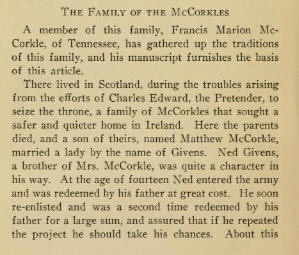
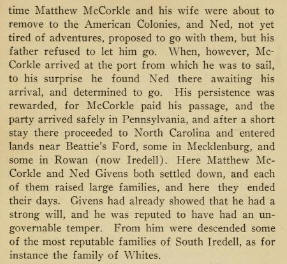
later

Dr.
Francis Marion McCorkle, the great grandson of Matthew McCorkle, seems to have
been the source of Rumple's McCorkle information. This story is similar to the the Dudley McCorkell legend
below. Notice that this
1881 sketch asserts that Matthew was born in Scotland or Ireland and married "a
lady by the name of Givens" in Ireland. It does not name Matthew's parents, his birth date or the given name of Matthew's wife. Strangely, the name of lady Givens brother, Ned, is
remembered, along with some detail about him, including the assertion that
Matthew paid Ned's passage fare to America. "Charles Edward, the Pretender" was
born in 1720 and led the Jacobite revolt to seize the Scottish throne in 1745,
so these facts do not fit at all with the assumed birth date (c1720) of Matthew
McCorkle. However, the followers of Charles Edward were called Jacobites and
they were in revolt at various times from the late 17th
century until 1745, so perhaps Rumple just added some inaccurate
hyperbole. The other alternative is that Matthew was born a lot later than has
been assumed by researchers of this line. There is no primary evidence of Matthew in Pennsylvania,
but he and sons Thomas and Francis are recorded in North Carolina by several primary records
and a grandson wrote that his father Francis was born in Lancaster County,
Pennsylvania.
Matthew McCorkle & sons
Alexander, Thomas & Francis
From:
Notes of Dudley McCorkell of Londonderry, Ireland (Courtesy of Laurie
Thompson, Melbourne, Australia)
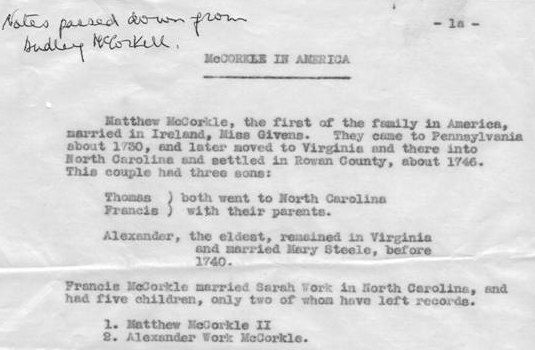
This snippet is the Rumple account directly above with the addition of Alexander
of Lexington. The author, Sir Dudley Evelyn
Bruce McCorkell (1883-1960), was a Mayor of Derry and a Lord Lieutenant of County
Londonderry, Northern Ireland. He was also an Irish McCorkell family historian who
corresponded with McCorkles in the U.S. One of his correspondents was William
Alexander MacCorkle (1857-1930), a Governor of West Virginia and a descendant of Alexander & Mary Steele MacCorkle, alleged to be the son of Matthew McCorkle in the
above snippet. William A. MacCorkle wrote several books, but I have been unable
to locate a lineage attributable to him. However, Oren F. Morton states in his A History of Rockbridge County
(see above) that William McCorkle was the father of Alexander of Lexington.
Also, Samuel B. Judah alleges that Samuel McCorkle of Paxtang was the brother of
Alexander of Lexington and that they came from Ireland on the same ship. Apparently, Louis
McCorkle also corresponded with Sir Dudley and John Hale Stutesman, the
transcriber of the Judah Chronicle; however, McCorkle seems to have accepted
Morton's story over the two competing versions.
The McCorkle Book by C. P. Crosby. Pub. Nov., 1988

The above snippet is a photographic copy of some the the opening sentences of Caleb Pickens Crosby's book. Our thanks go to David McCorkle for making us a copy. Mr. Crosby seems to have been the "g-g-g grandson of Major Francis McCorkle". This description reads much like the above Jethro Rumple story published in 1881. However, a Matthew McCorkle I has been added as the father of Rumple's Matthew McCorkle with no explanation of this discovery. Also, "lady" Givens has been assigned the given name of Jean.
From: The McCorkle Book, aka the McCorkle Family by Caleb Pickens Crosby. Pub. 1988

This snippet was taken from the interesting "The Family Genealogy
Website" by Curtis Dean Loftin and is attributed to the C. P. Crosby
(1917-1994) book.
This is a similar
story to the Crosby version, directly above, except that Samuel has been added
to Matthew's name with no explanation.
American Three Brothers Legend
An almost universal McCorkle family legend can be termed the "American Three
Brothers Legend". American because there is a similar "Three
Brothers Legend" (see above) in Ireland. There are several versions of the American
legend and the details vary dramatically from one McCorkle line to the other,
but the three brothers part is almost always the same. I am suspicious that one of
the versions was derived from the other.
Three
Brothers: Archibald, John & William
From:
A Twentieth Century History of
Turnbull County Ohio, Volume II, by Harriet Taylor Upton. Published 1909
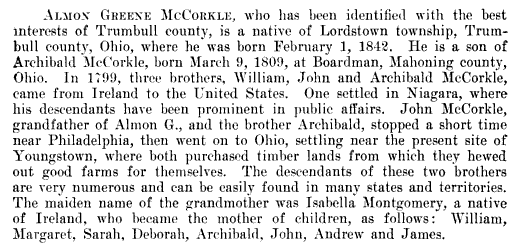
Above is an account of a later "Three Brother"
McCorkle immigration that allegedly occurred in 1799. Although apparently
unaware of the legend, Mary Grieves Otterson, has done very well documented
research (The McCorkle Family, from Ireland to
PA and Ohio with some descendants who settled in the Mid-West, self
published, 1992) on the Archibald (c1770-c1808) and John McCorkle (1774-1833) that moved
from Bucks County, Pennsylvania to Trumbull County, Ohio in the early 1800s. Otterson does not mention a brother William, but she does point out that
Archibald McCorkle Jr. and John McCorkle were living very close to Archibald
McCorkle Sr. in the 1800 Newtown Township, Bucks County census. So it seems that
it is very possible to Otterson and us that Archibald Jr. and John were the sons
of Archibald McCorkle Sr. (c1735-1828), so at least
part of the story seems to have been confirmed. We can find
nothing about William McCorkle in any Niagara, "where his descendants have been prominent
in public affairs" and we wonder if "Niagara" was a misunderstanding or
typo somewhere along the line; however, in the early 19th century,
there were no lack of William McCorkles that were born in the same time frame as
Archibald and John McCorkle.
From: Huntington County, Indiana, History & Families 1834-1993;
McCorkle/Davis/Cartwright/Montgomery
by Mildred Davis Saal. Published 1993
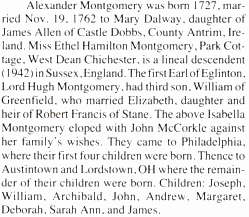
Mildred D. Saal wrote that she was the beneficiary of the research of several professional historians while she was in Ireland. With respect to John McCorkle and Isabella Montgomery, this article supports the story directly above.
Thomas McCorkle
From: History of Dauphin County, Pennsylvania, Vol. III by Luther Reily Kelker.
Published 1907

This 1907 snippet of a well written biography alleges that Joseph McCorkle, born in 1845, was the great grandson of the Scottish emigrant Thomas McCorkle who settled in Lebanon County, Pennsylvania. The children of Thomas Jr., Joseph Sr. and Joseph Jr. are named and many exact dates are given. About the only things missing are details concerning Thomas Sr. Although Lebanon County was not formed until 1813, its parent county was Dauphin which was formed from Lancaster in 1785 and the area that is now Myerstown was settled in the 1730s. So, it is in Lancaster County and vicinity that a researcher might find early references to Thomas McCorkle and that is the case. In the History of Lancaster County, Pennsylvania written by Franklin Ellis & Samuel Evans and published in 1883, Pennsylvania Archive records of both Thomas McCorkle and Robert McCorkle are mentioned: Thomas as a militiaman in 1756 and Robert as a recently married landowner in 1757. We can only guess at the ages of these men and their relationship, but at least a Thomas McCorkle is mentioned in the area that is asserted by the above biography. Here is a story that seems to be much more truth than fiction.
Robert McCorkle
From: Commemorative Biographical Record -
Washington County, Pennsylvania. Edited & published 1893 by J. H. Beers & Co.


This snippet is from another well written biography and is very similar to the one directly above that
mentions Thomas
McCorkle Jr. & Sr. It was published in 1893 and alleges that Thomas McCorkle, the
son of Robert McCorkle from the north of Ireland, was born Feb 12, 1759 in Adams
County, Pennsylvania. The children of Thomas and many exact dates are listed.
In 1934-1937, members of the DAR surveyed some of the Washington County,
Pennsylvania
cemeteries. Robert McCorkle's death, as recorded on his tombstone, was June 22,
1822 at the age of 90, so Robert was born about 1732. He was almost surely the
same Robert McCorkle mentioned in the narrative direct above. He was married to
Margaret Reed who died in 1809 at age 90 and is buried in New Oxford, Adams
County, Pennsylvania.
Adams County was formed from York in 1800 and adjoins Lancaster to the east.
The 1790 York County census enumerates a Thomas (2 males) & Robert McCorkle (1
male). Also, for
the period of 1779-1789, Robert, Thomas and James McCorkle (and variations)
were taxed in Reading, York County in most years and recorded in Pennsylvania
Tax and Exoneration, 1768-1801. A little more digging in the Pennsylvania
Archives, Series 3, Vol. XXI revels a 1783 York County "inhabitants" list
which includes Robert McCorkel, 180 acres, 6 inhabitants; James McCorkel, 100
acres, 4 inhabitants and Thomas McCorkel. We could find no earlier records
of Robert in York County; however, as mentioned above, he was recorded in 1757 in
adjacent
Lancaster County.
In his book From Viking Glory..., Louis McCorkle
recorded a contributed lineage for "Robert McCorkle of Cross Creek,
Pennsylvania". In addition to Thomas McCorkle, the contributor asserted that
James McCorkle was another son of Robert and that this relationship was
documented in same Washington County Commemorative book noted above.
While we also are of the opinion that James was a another son of Robert,
we cannot find any mention of this
relationship in the book. James' tombstone was also recorded in the
abovementioned cemetery census. He died March 21, 1814, age 58, so he would have
been born about 1756. While researching the Washington County, Pennsylvania
McCorkles, we ran across another Robert McCorkle who was born in 1783.
Circumstantial evidence suggests that this Robert was a son of James.
Again, as with the story directly above, we have a story that seems to be much
more truth than fiction. We think
it is highly probable that Robert McCorkle and the Thomas McCorkle discussed
directly above were closely related and likely brothers. While some other
researchers have suggested that these men were the sons or grandsons of the
James McCorkle discussed in the introduction to this page, we doubt that this is
the case; however, this is a great opportunity for male descendants to to join
the
McCorkle DNA Project and help
confirm or contradict this proposition.
Please send me your legends or comments
Back to
McCorkle Home Page
Created Nov 1, 2012
Revised Apr 3, 2018